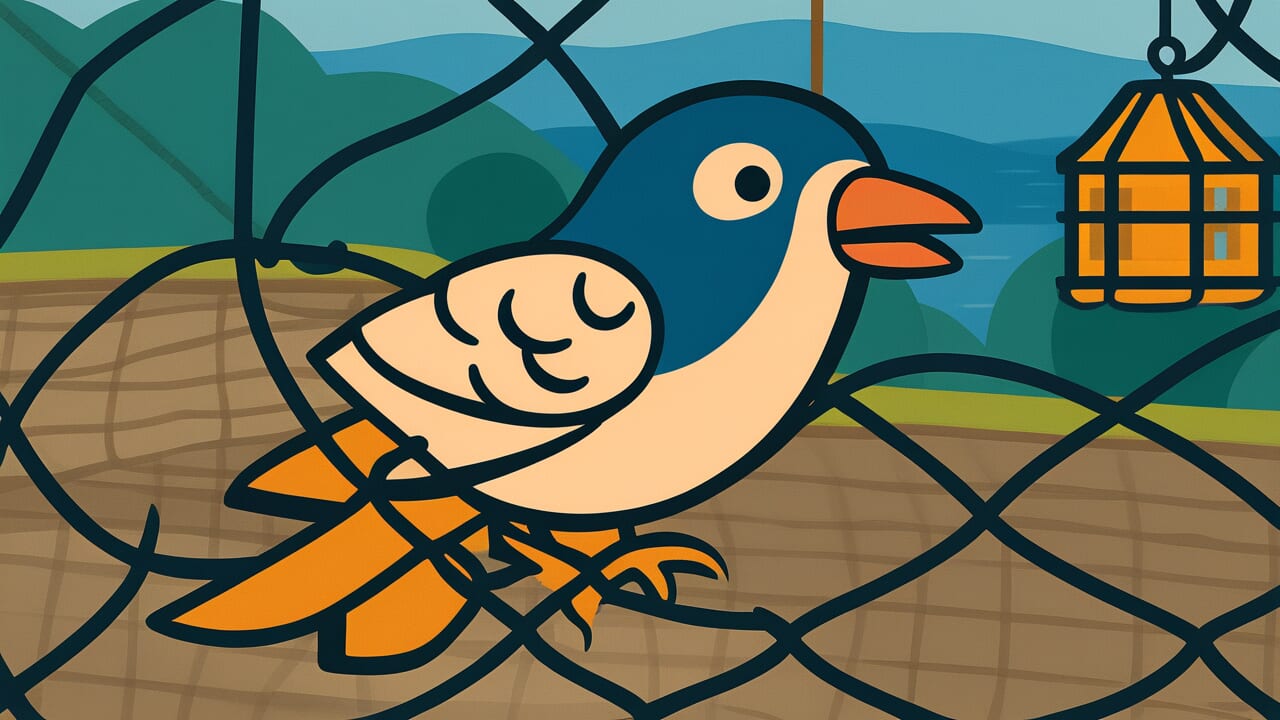How to Read “擌”
わなにかかれるとり
Meaning of “擌”
“擌” means falling into a situation where you cannot escape no matter how hard you try. Like a bird caught in a trap that cannot become free no matter how much it flaps or struggles, humans too can find themselves trapped in unavoidable situations.
This proverb is mainly used when someone falls into a difficult situation they cannot escape from as a result of their own actions or choices.
It applies when someone is chased by debt and cannot move, when wrongdoing is discovered and there’s no way to talk their way out, or when they cannot escape from problems they created themselves.
People use this expression rather than simply saying “difficult situation” to emphasize the inescapability and immobility of the circumstance.
The concrete image of a trap vividly conveys the seriousness and desperation of the situation.
Even today, the visual power of these words remains effective when expressing situations where someone is cornered as a result of their own doing.
Origin and Etymology
No clear written records remain about the origin of this proverb. However, we can examine it through its component elements.
“Wana” (trap) refers to a device used to catch birds and animals. Since ancient times in Japan, various traps have been used to secure food.
Devices using tree branches and traps with spread nets were essential techniques for catching birds.
The background of this proverb likely comes from observations by people who actually practiced trap hunting. A bird caught in a trap desperately flaps its wings and struggles in agony.
However, the more violently it moves, the more strongly the trap holds the bird. The very act of trying to escape makes the situation worse.
People who witnessed this scene must have found common ground with human circumstances.
Trap hunting has a long history as part of hunting culture. The observational skills cultivated through this process likely gave birth to this proverb.
Through their relationship with nature, people had the wisdom to read life lessons from animal behavior.
They overlapped the helplessness of falling into an inescapable situation with the image of a bird caught in a trap.
Usage Examples
- His accounting fraud was exposed, and now he has no escape like 擌
- Confronted with evidence of fraud, he struggles like 擌
Universal Wisdom
The proverb “擌” has been passed down through generations because it contains deep insight about the inevitable consequences of human actions.
This proverb shows the harshness of cause and effect. Getting caught in a trap is not an accident.
It results from being lured by bait and failing to stay alert. Humans too can be blinded by immediate gains or desires and choose dangerous paths.
By the time they realize it, they have already reached a point of no return.
What’s interesting is that this proverb focuses on “inescapability.” A bird caught in a trap has its fate sealed the moment it’s caught.
No matter how much it struggles, its efforts end in vain.
This brutally realistic description teaches the weight of responsibility humans must bear for their own choices.
Our ancestors knew this truth. They knew there are turning points in life from which you cannot go back.
Once you step in, there are situations you cannot escape no matter how much you regret or how desperately you try.
That’s why this saying continues to advocate the importance of being careful in daily conduct and having the strength not to succumb to temptation.
It is a stern yet loving warning to humanity that transcends time.
When AI Hears This
When we observe birds caught in traps, we fall into a serious misconception. We see only “birds caught in traps” and conclude “birds get caught in traps.”
But think about it. If 100 birds pass near a trap and only 3 get caught, the real probability is 3 percent.
Yet we only witness the “3 caught birds.” The 97 that wisely avoided it leave no record or memory.
This is a phenomenon called “survivorship bias” in statistics. During World War II, the military examined bullet holes on returned bombers to strengthen armor.
But statistician Wald pointed out, “Wait. The shot-down aircraft should tell us where the truly weak spots are.”
Aircraft that returned home were proof those areas could withstand hits.
The trap story is the same. We observe only “failure cases” and mistake them for the whole picture.
In reality, birds that avoided the trap are the overwhelming majority, but they disappear from statistics in silence.
When looking at data, we need to imagine not just what’s visible but “what’s invisible.”
This proverb has been pointing to this core principle of modern data science for hundreds of years.
Lessons for Today
What this proverb teaches us living in modern times is the weight of choices and the importance of prevention.
Modern society is full of various temptations and traps. Investment schemes promising easy money, momentary pleasures, invitations to easy paths.
They look attractive, but once you step in, you may not be able to get out.
This proverb teaches the importance of having the courage to stop before making such dangerous choices.
Especially important is dealing with problems while they’re still small. Debt, tangled relationships, work mistakes—all can be corrected in early stages.
But if left alone, you’ll eventually be driven into a situation like “擌” where nothing can be done.
You have the power to protect your own life. It’s the caution not to jump at immediate gains, the sensitivity to detect danger, and the courage to turn back.
Before you’re completely caught in a trap, stop when you feel something’s wrong.
The accumulation of these small judgments will protect you.



Comments